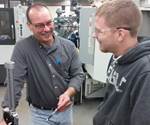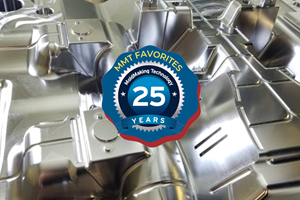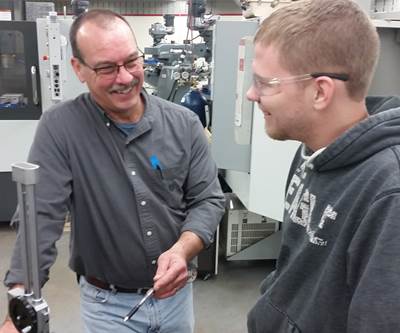Skills Center: Apprentice Training - Shop Math
Older workers insist on the need for more in-depth shop math, while the younger generation says that extensive use of computers in design and CAM make it unnecessary. Both are correct.
Shop math might be one of the most contentious topics among moldmakers who entered the industry in the 1970s and 1980s, and those who joined the field in the late 1990s. In general, within nearly every shop that I visit, the older generation insists on the need for more in-depth shop math, including high-end trigonometry, geometry and even some calculus. Generally speaking, the younger generation is adamant that learning shop math is no longer necessary because of the extensive use of computers in design and CAM. In my opinion, both generations are correct.
Although I believe it is true that computers have taken much of the previously required, problem-based math skills out of modern toolmaking, it would be a mistake to remove shop math entirely from our development programs. Typically, when pressed about the topic, both sides of the argument concede that a healthy middle ground should be found when building shop math into a program. Here are some reasons for keeping math, along with the topics I believe are important to retain.
Process thinking. Mathematics teaches process thinking and logic. For that reason alone, shop math must remain a part of an apprenticeship curriculum. Beyond learning how to solve equations, it trains the brain to see problems as a sequence of logical steps that leads to an objective solution. Very few topics allow a student to work through an uncomfortable problem that has an objectively correct answer. This is a very helpful skill to possess on the shop floor, and it is not something one is born with. This is a skill that can be developed with practice and patience. Continuously working through the difficulties of mathematical problems inherently trains the brain to see all problems as solvable by following a logical sequence of actions. The critical thinking skills developed through shop math cannot be replaced.
Decimal and fraction conversions. Every apprentice should memorize and be able to easily convert decimals and fractions. This is an everyday skill that should be practiced until it becomes second nature. Every individual company should require a standard set of fractions that every apprentice can convert from memory based on each company’s unique standards. On top of that, apprentices should be expected to make close estimates of fractional conversions across the scale. This is just a skill that every worker in the industry should possess.
Metric and standard. This may be a simple formula, but it is a little-mastered skill. Most of the companies I work with predominantly operate in either standard or metric. Yet, periodically every one of these companies will get a job that is being built using the system that they are not comfortable with using. This seems to cause an inordinate amount of confusion, mistakes and delay. Every apprentice should be able to convert numbers from metric to inch and inch to metric, effortlessly. This means spending a lot of time practicing it in class and then forcing the students to practice applying it on the shop floor. Again, this is just an essential shopfloor skill that every worker should have.
Percentages, averages and ratio. Being able to calculate percentages, averages and ratios are also important skills to have on the shop floor. From a machining standpoint alone, being able to calculate percentages on stepovers and stepdowns will help with understanding machine load and tool life. Understanding how to calculate averages can help in capacity planning. Ratios are important to tool length and other setup variables. These are just a few of the countless scenarios where a person might need these skills on the shop floor.
Geometry. All mold and fixture designs are built from geometric shapes. Every apprentice needs to be able to identify common geometric shapes and notice the difference between plane figures and solid figures. They should also be able to describe how to measure geometric shapes. Every apprentice should possess the ability to define geometric dimensions and communicate with designers and engineers competently and effortlessly using the proper geometric terminology. This is the language that solid modeling is built upon, so if an apprentice does not have a full understanding of these concepts, his or her career advancement will be highly limited.
Algebra. Every person working in moldmaking will encounter basic algebraic formulas at some point in his or her career. So, at the very least, every apprentice must have complete mastery of the order of operations (or PEMDAS, which stands for parentheses, exponents, multiplication and division, and addition and subtraction) to be able to solve these formulas. Having the ability to solve for unknown variables is important to productivity calculations, feeds and speeds and many other important shopfloor calculations. The results of these calculations can change dramatically if you process their respective formulas wrong.
Trigonometry. Working with sine bars and sine plates is still a common practice in most moldmaking environments. No apprenticeship should be completed without having the ability to identify the different types of triangles (isosceles, equilateral, obtuse and right), as well as their respective components. Each apprentice should be able to use all sine, cosine and tangent functions and calculate gage block stacks. Every apprentice should also be able to use the Pythagorean theorem (the square of the side opposite the right angle is equal to the sum of the squares of the other two sides) to solve for unknown angles and sides.
There is no doubt that there could be more topics added to this list and that this list could inspire a lively discussion about the necessary level of shop math in our industry. I have found myself on both sides of the argument, but have concluded that, at the very least, the topics mentioned here should be mastered, not just covered or reviewed, to help an apprentice in his or her career and provide a solid foundation for learning more complex topics in the future.
Related Content
Leading Mold Manufacturers Share Best Practices for Improving Efficiency
Precise Tooling Solutions, X-Cell Tool and Mold, M&M Tool and Mold, Ameritech Die & Mold, and Cavalier Tool & Manufacturing, sit down for a fast-paced Q&A focused on strategies for improving efficiencies across their operations.
Read MoreTackling a Mold Designer Shortage
Survey findings reveal a shortage of skilled mold designers and engineers in the moldmaking community, calling for intervention through educational programs and exploration of training alternatives while seeking input from those who have addressed the issue successfully.
Read MoreUnique Mold Design Apprenticeship Using Untapped Resources
To help fill his mold design skills gap, Jeff Mertz of Anova Innovations, is focused on high schools and underprivileged school districts, a school that has lower graduation and college entrance rates. The goal is a student-run enterprise.
Read MoreHands-on Workshop Teaches Mold Maintenance Process
Intensive workshop teaches the process of mold maintenance to help put an end to the firefighting culture of many toolrooms.
Read MoreRead Next
Skills Center: Apprentice Training - Work Ethic and Attitude
Once a new employee is hired, it is the company’s responsibility to teach that new hire the requirements and expectations of the position, including how to work with good work ethic and a positive attitude.
Read MoreReasons to Use Fiber Lasers for Mold Cleaning
Fiber lasers offer a simplicity, speed, control and portability, minimizing mold cleaning risks.
Read MoreAre You a Moldmaker Considering 3D Printing? Consider the 3D Printing Workshop at NPE2024
Presentations will cover 3D printing for mold tooling, material innovation, product development, bridge production and full-scale, high-volume additive manufacturing.
Read More















.jpg;maxWidth=300;quality=90)









